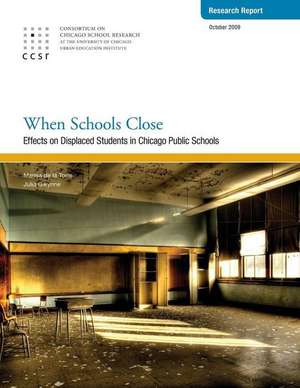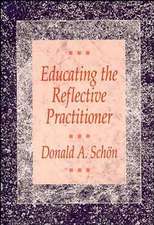When Schools Close
en Limba Engleză Paperback
Preț: 103.15 lei
Nou
Puncte Express: 155
Preț estimativ în valută:
19.74€ • 20.66$ • 16.33£
19.74€ • 20.66$ • 16.33£
Tipărit la comandă
Livrare economică 07-21 aprilie
Preluare comenzi: 021 569.72.76
Specificații
ISBN-13: 9780981460482
ISBN-10: 0981460488
Pagini: 48
Dimensiuni: 216 x 280 x 3 mm
Greutate: 0.18 kg
Editura: Consortium on Chicago School Research
ISBN-10: 0981460488
Pagini: 48
Dimensiuni: 216 x 280 x 3 mm
Greutate: 0.18 kg
Editura: Consortium on Chicago School Research
Notă biografică
MARISA DE LA TORRE is an Associate Director at UChicago CCSR. Before joining UChicago CCSR, she worked for the CPS Office of Research, Evaluation, and Accountability. She received a master's degree in Economics from Northwestern University. JULIA GWYNNE is a Senior Research Analyst at the Consortium on Chicago School Research. Her research interests include student mobility, curriculum policies, and special education. She received a PhD in sociology from the University of Chicago. The University of Chicago Consortium on Chicago School Research (UChicago CCSR) builds the capacity for school reform by conducting research that identifies what matters for student success and school improvement. Created in 1990 after the passage of the Chicago School Reform Act that decentralized governance of the city's public schools, UChicago CCSR conducts research of high technical quality that can inform and assess policy and practice in the Chicago Public Schools. UChicago CCSR studies also have informed broader national movements in public education. UChicago CCSR encourages the use of research in policy action and improvement of practice but does not argue for particular policies or programs. Rather, UChicago CCSR helps to build capacity for school reform by identifying what matters for student success and school improvement, creating critical indicators to chart progress, and conducting theory-driven evaluation to identify how programs and policies are working.
















